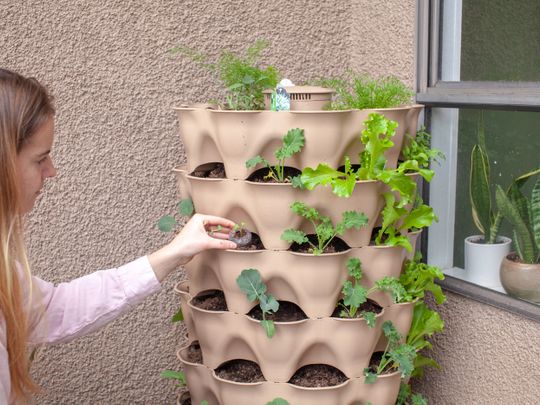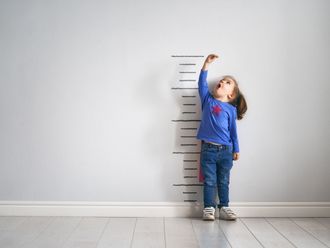
“‘Why does this say fresh frozen blueberries?’ she asked, pointing at the label. I had no idea when she’d started to read,” says Filipino expat Lilly, who requested her name be changed for this article. Dubai-born and based Lilly was talking about her daughter, who is unschooled.
This phenomenon – where you ditch the curriculum, timings and exams and focus instead on what your child is interested in – is still in its nascent stage, but it’s catching on.
Lilly discovered unschooling, or experience-based learning, when her first born was in nursery and she got pregnant. “My second pregnancy was tough. We first decided to homeschool and later, took a break from proper homeschooling for about a year. During that time, I realised that she could pick up more things by herself when it came to learning,” she explains.
How does unschooling work? And how is it different from homeschooling?
Unconventional school is a broad spectrum. On one side there’s homeschooling, which is a more structured approach to teaching. A child will follow a curriculum, they will have certificates and earn their degrees. They will learn several subjects – some of which they may not quite love.
When it comes to unschooling, explains Lilly, “We don't follow a curriculum. We basically go with whatever our children's interests are. So more than a teacher, we are facilitators. It's not as hands-off, as a lot of people think it is … you really must be quite switched on. And you really do have to serve your children's interests and keep fueling learning. So, you know, you need to have the resources for that. If you don't, then you outsource it, depending on what their interests are.”
Ross Addison, Managing Director and Consultant Child and Adolescent Cognitive Behavioural Therapist at UAE-based Reverse Psychology, adds: “Home schooling should be considered on a child-by-child basis. I work with many children who are home schooled, and they very much enjoy it. There is freedom to get their work completed at times that fit them whilst also maintaining and adhering to deadlines. The downside of this is the loss of daily socialising with a large range of people. Of course, some children will make up for this in the evenings and weekends, but there is still the loss of the eight-hour school day and being exposed to many different personality types.”
Leadership matters
It takes tact and cunning to ensure one’s child learns a variety of things in the case of unschooling. British mum-of-three and educational consultant Heather Harries says: “The issue with homeschooling and with unschooling is that a child will follow their passion, so if it’s math, they will almost be over educated in that and then not do subjects they don’t like. Now if there’s a parent who is good at guiding them and getting them to learn [that’s great]. Giving children responsibility for their own learning is a good thing; it just depends on who manages that responsibility.”
Can you transition from unschooling to traditional classes?
It’s difficult, says Harries. “There are multiple options of teaching, and unschooling is one of those options where once you’ve unschooled it’s very hard to go into traditional situation, because you are not used to learning two frames of work, so you’ll always go too deep to pass exams, you’ll have difficulties in passing exams because you’ll have an imbalance in what you’ve learned. Kids are particularly intelligent but to put them from unschooling into school is very, very difficult,” she explains.
Harries’ daughter was homeschooled for two years before going back to do her General Certificate of Secondary Education (GCSEs) in conventional class. “I can’t say it was a seamless transition, but it worked,” she laughs. “What a lot of parents do these days, because of financial constraints, they will homeschool for primary and then move them through. What I tell parents is – if you want to homeschool, fine. But if you get to year six in primary, it’s a good idea to get them started into proper mainstream school, because they need to learn socialisation, the way of learning, the discipline of sitting at a table for hours. It’s all the extra bits that they won’t have done at a homeschool level.”
Or she suggests having kids go to school for their primary classes and getting them to do their A levels from home; a child is an independent learner at that point, so it’s easier to adjust.
What happens if an unschooled pupil decides to go to college or university?
The times are generous to unconventional learners, says Lilly. “If my kids do decide to go on to university, for instance, they would do it back home in the Philippines. And in the Philippines, the requirements are, you simply take a couple of [equivalency] exams? And if you pass them, then you're good to go for university. So, I think depending on the requirements of the country that you're looking at moving to in the future, you can decide on the course of action. But then, to be honest, currently, even big universities are open to accepting people if you pass the assessment.”
Independent learners
A child who is unschooled will generally take their time to learn a subject, to deep dive into a topic. While it may look as restrictive, UAE-based unschoolers argue that these kids know how to learn, how to be resourceful, how to find answers. Lilly offers an example: “Last year, my daughter was very much into the games Minecraft and Roblox. She was so interested in it that she decided she wanted to learn how to code. So, she learned how to do Python on her own.
“It’s very interesting to see… I find that if you don't really force a specific subject on them, they take their own sweet time learning it. And usually, it comes in phases. So, for instance, last year, she was super interested in coding. This year, she’s got completely different interests: music and sports. These interests come and they go, really, and it's just a matter of catering to them, and kind of knowing how to pull out the resources for them when they're needed.”
Fosters independent thought.
Helps a child learn about research and how to learn.
Takes the ‘work’ out of school and learning.
Makes a child specialise in a subject early on.
Cons:
Social skills may be affected.
Will specialise in one subject, maybe clueless in another.
Misses out on what conventional classes have to offer – learning about teamwork, turn-taking, socialization, and delayed gratification.
Is it time to pull students out of school?
It depends on the child, say experts. Harries argues: “Traditional school has been developed over centuries and it gives children very basic, good understanding of what they can do. So, they learn their writing, they learn their reading, they learn their maths, they learn the things they are likely to be asked as they grow older.
“But the thing about school is, it’s not about what you learn, it’s about who you meet and about who inspires you. And I think the merit of school is the socialisation and the learning that’s incidental to that. School is all about an all-rounded child.”
The caveat: schools need to evolve; the curricula in circulation is veering towards obsolete. “With artificial intelligence coming on-board, I don’t think traditional degrees will have a place in 20 years’ time,” she adds.
The conclusion then is, there is no one right answer for a family – before you decide to unschool, consider the commitment required, your child’s needs and the resources you will be able to command when needed.
Have a topic to discuss? Write to us at parenting@gulfnews.com








